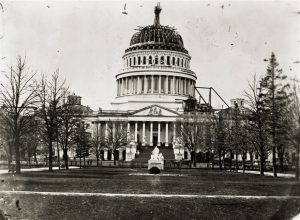June 28, 1864: “Hereby, Repealed”

Be it enacted by the Senate and House of Representatives of the United States of America in Congress assembled, That section three and five of an act entitled “An act respecting fugitives from justice and persons escaping from the service of their masters,” passed February twelve, seventeen hundred and ninety-three, and an act entitled “An act to amend, and supplementary to, the act entitled ‘An act representing fugitives from justice, and persons escaping from the service of their masters,’ passed February twelve, seventeen hundred and ninety-three,” passed September eighteen hundred and fifty, be, and the same are hereby, repealed.
APPROVED, June 28, 1864.
One hundred fifty-five years ago – on June 28, 1864 – the Fugitive Slave Acts were repealed. Originating in the 18th Century and strengthened as part of the Compromise of 1850, these acts had allowed slave catchers to legally pursue men, women, and children who had escaped slavery and sought refuge in Free Soil States. Especially in 1850, it had sparked outrage among the abolitionists and horror as communities saw free blacks with manumission papers or former enslaved who had run for freedom, dragged back to bondage.
The first Fugitive Slave Act – from 1793 – enabled local civic authorities to capture and send those who had escaped slavery back to their owners. The local governments could also penalize anyone who had aided in the run toward freedom. However, as the decades passed, northern states abolished slavery and became free soil, and the underground railroad network organized, the penalties and enforcement was comparatively lax. That did not particularly please the slaveholders in the Southern and Border States.

When 1850 and the need for yet another compromise arose, part of that new agreement included new measures for that original 1793 act. The Fugitive Slave Act of 1850 threatened harsh punishments for anyone aiding in escapes or protecting/hiding the fugitives. It also allowed “slave catchers” to take freedmen back to the slave states to be returned or resold. Many African Americans living in the Free Soil States feared for their futures and understandably sought a more permanent refuge in Canada. The act sparked controversy and feed the abolitionist cause as violence, kidnappings, and other horrors played out in communities that valued personal liberties.
In June 1862, a congressman from Maine – John Hovey Rice – presented a petition, asking Congress to take two important steps. First, repeal the Fugitive Slave Law of 1850. Second, take property from the Rebels and ensure the freedom for all enslaved. Instigated by the civilians from Farmington, Maine, this petition eventually got an addition: asking for a modification to the law to allow the “alleged Fugitive” a trial by jury. Rice faithfully and passionately presented the petition, detailing the evils of slavery and declaring that “slavery being in itself wrong, can, as a system, only be secure in wrong government.”
However, it took time for the petition to transform into an actual repeal. The war continued. The Lincoln Administration issued the Emancipation Proclamation, and the U.S. military altered their policies toward African American soldiers and refugees seeking freedom with the Union armies.
Finally, on June 28, 1864, Congress took a significant step, repealing both Fugitive Slave Acts. It was another step toward the 13th Amendment the following year.
I think this historic moment often gets overshadowed by the campaigns around the same time in 1864. However, if we take just a moment to think about it, this Congressional repeal meant that part of the enforcement of slavery crashed down. No longer would the United States government hinder the pursuit of freedom or punish citizens who helped the enslaved escape.
It becomes a foreshadowing moment as Congress prepared to take on the debate over a new Constitutional amendment, one that would abolish slavery within the United States. And it added to the meaning of freedom that would emerge from the Civil War. It’s a reminder that the idea “let us die to make men free” would be permanently secured through the votes of Congress, and in this case, the repeal of a long-standing set of acts.
Sources:
United States House of Representatives, History: https://history.house.gov/Records-and-Research/Listing/pm_020/
Library of Congress, An Act to Repeal the Fugitive Slave Act: https://www.loc.gov/law/help/statutes-at-large/38th-congress/session-1/c38s1ch166.pdf
Good post and something I hadn’t known. I assumed the acts were subsumed by the 13th and 14th amendments when they were passed.